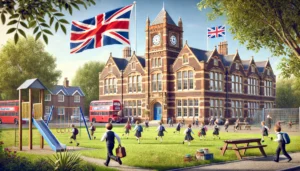Unveiling UK Education: Your Guide to Diverse School Types in 2024

Overview of the UK School System
Common Types of State-Funded Schools in the UK
Types of Independent Schools in the UK
Other Types of Schools
How to Find Schools in England
Useful Links for Finding Schools
Further Reading
Overview of the UK School System
The UK has a diverse school system, offering a wealth of choices for families. According to data released by the Department for Education in January 2024, there are 24,442 schools in England, including:
- 383 state-funded nurseries
- 16,783 state-funded primary schools
- 3,444 state-funded secondary schools
- 2,408 independent schools
- 1,035 state-funded special schools
- 335 state-funded alternative provision schools
- 54 non-maintained special schools
(Source: Gov.UK)
Common Types of State-Funded Schools in the UK
State-funded schools are the most common type of school in the UK, funded and managed by the government. They can be further divided into the following categories:
- Maintained Schools: These are the most common type of state-funded schools, funded and managed by local authorities. Maintained schools must follow the national curriculum and are open to all eligible children. Maintained schools can be further divided into the following types:
- Comprehensive Schools: Non-selective secondary schools that accept students of all academic abilities, aiming to provide a more inclusive education for everyone.
- Community Schools: Managed by local authorities and open to all children in the area, regardless of their religious beliefs or abilities.
- Foundation and Trust Schools: Compared to community schools, these have more autonomy over their curriculum and operations. They are still maintained by local authorities but have a governing body that controls admissions and finances.
- Voluntary Aided Schools: Mostly faith schools (usually Church of England or Catholic), they receive funding from both the government and religious organizations. They can select students based on religious beliefs but must also provide some places for non-religious students.
- Voluntary Controlled Schools: Similar to voluntary aided schools, but local authorities have more control over admissions and staffing.
- Academies: State-funded schools with greater freedom than maintained schools. They can set their own curriculum, term dates, and uniforms. Academies are run by academy trusts.
- Free Schools: Similar to academies, but set up by groups such as parents, teachers, or charities. They have more independence than academies and receive funding directly from the government.
- Grammar Schools: State-funded secondary schools that select students based on academic ability through the 11+ exam. There are currently around 163 grammar schools across the UK, with some areas having a higher concentration.
- Partially Selective Schools: These schools were originally comprehensive schools but were later allowed to select a proportion of students based on ability or talent. Selection criteria vary by school and typically include entrance exams.
Types of Independent Schools in the UK
Independent or private schools are funded by private sources. These funds mainly come from tuition fees, donations, and long-term charitable endowments. These schools do not have to follow the national curriculum and have more flexibility in designing their programs. Here are some key points about independent schools in the UK:
- Number: There are about 2,400 independent schools in the UK.
- Student Proportion: They only account for about 7% of the total number of students in England, but a higher proportion of students over the age of 16, around 18%.
- Resources: These schools typically have smaller class sizes and more resources, such as advanced facilities and more extracurricular activities.
- Admissions: Schools select students based on academic ability and extracurricular performance.
There is a wide variety of independent schools in the UK, classified by the age of students they admit and whether they offer boarding:
- By Age:
- Pre-Prep Schools (2-7 years): Equivalent to nurseries, focusing on early development through play and exploration.
- Prep Schools (8-11 or 13 years): Prepare students for entry into top independent schools or state grammar schools.
- Senior Schools (11 or 13-16 or 18 years): Guide students through GCSE and A-Level courses. Some schools have sixth forms, while others end at age 16.
- All-Through Schools (3-16 or 18 years): Cover all educational stages, from nursery to sixth form.
- Sixth Form Colleges (16-18 years): Specialize in A-Level courses for students.
- By Boarding:
- Boarding Schools: Students live at the school during term time and go home during holidays.
- Day Schools: Students attend school during the day and return home in the evenings and on weekends.
Note that some schools may be hybrids of these categories, such as prep schools that offer boarding for students aged 8 to 13.
Other Types of Schools
- Special Schools: Cater to children with special educational needs.
- Sixth Form Colleges: Provide education for students over 16, typically A-Level, BTEC, and other vocational qualifications.
- Further Education Colleges: Offer a wide range of vocational courses, apprenticeships, and adult education programs.
How to Find Schools in England
Here are some ways to find schools in specific areas of England:
- Council Website: Check the website of the local authority you are interested in to find information about schools in that area.
- Online Search: Government websites like GOV.UK allow you to search for schools by location and type.
- Locrating.com: Locrating.com is a website that helps parents find schools and nurseries. They offer a range of features to assist in this process.
Useful Links for Finding Schools
- GOV.UK Website
- Locrating.com (Paid Subscription)
- The Good School Guides (Paid Subscription)
- The Sunday Times School Guide (Paid Subscription)
Further Reading
Brickong is a second-hand estate agent based in South London, specialising in areas such as Sutton, Kingston upon Thames, New Malden, Guildford, Epsom, and Wimbledon. Click the links for more details on our Property Buying Services or Property Renting Services.
Disclaimer: Please note that this information is for reference only. Additionally, the information on this website does not constitute investment advice. Please carefully assess the risks and seek professional advice.
